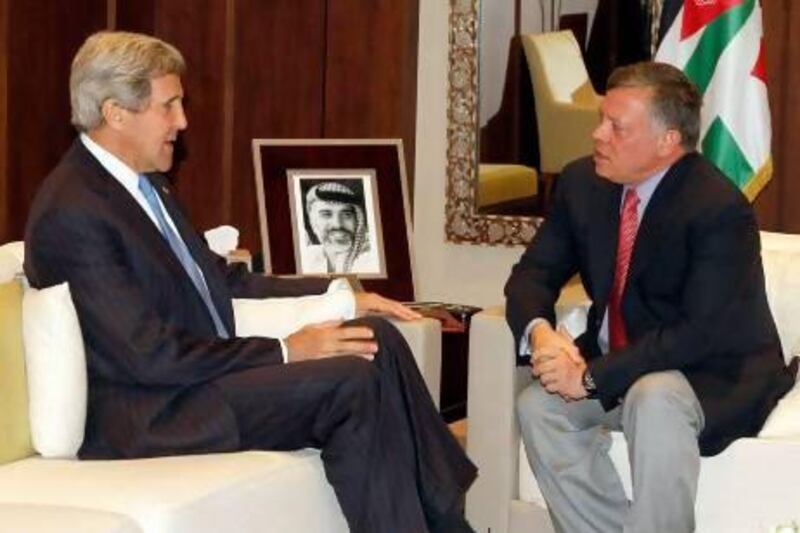RAMALLAH // John Kerry began two days of shuttle diplomacy between Israeli and Palestinian leaders yesterday, pushing ahead with his faltering efforts to revive their lifeless peace process.
This will be the fifth visit to the region this year by the US secretary of state, who met Jordan's King Abdullah in Amman yesterday before a scheduled dinner with Israel's prime minister, Benjamin Netanyahu, in Jerusalem.
He is expected to meet Mahmoud Abbas, the president of the Palestinian Authority (PA), in the Jordanian capital today.
Mr Kerry's peacemaking - which includes reviving an 11-year-old Arab League peace initiative and a proposed economic-development plan for Palestinians - has thus far failed to bring the parties back to the negotiating table.
His endeavors were probably not made any easier by Mr Netanyahu. Ahead of Mr Kerry's arrival in Israel, the Israeli leader delivered tough remarks yesterday that expressed sceptisim over the durability of a peace deal with the Palestinians, saying that any agreement would not "eliminate the unbridled defamation of the Jewish state".
He said such a peace accord had to be based on security "and not on goodwill", alluding to his longstanding demand of keeping Israeli troops stationed inside a future Palestinian state. Palestinians would almost certainly reject that idea.
Complicating matters further was an Israeli announcement on Wednesday authorising construction of 69 units in the East Jerusalem settlement of Har Homa.
It was unclear whether Mr Netanyahu gave the orders for the construction, but it evoked a strong reaction from the Palestinian leadership, which refuses to rejoin peace talks without a total halt to settlement construction in the occupied Palestinian territories.
Saeb Erekat, the chief Palestinian peace negotiator, yesterday called for international action to halt the expansion of Israeli settlements.
"The international community should understand that in order to create the right environment for negotiations it should not grant impunity to Israel over its repeated crimes and violations," he said.
The international community considers Israel's settlements, which house more than 500,000 people in East Jerusalem and the West Bank, illegal.
The US State Department described Israel's newly authorised settler construction in Jerusalem as "unhelpful" but added that "we remain hopeful that both parties will recognise the opportunity and the necessity to go back to the table".
Another potential obstacle to Mr Kerry's efforts has been the recent flurry of statements by right-wing Israeli officials in Mr Netanyahu's coalition. They have criticised the US leader's efforts and outright rejected the creation of a Palestinian state.
Still, during a visit to Kuwait on Wednesday, Mr Kerry insisted that his efforts were not in vain, despite great scepticism among both Palestinians and Israelis.
"I believe they believe the peace process is bigger than any one day or one moment, or certainly more important to their countries than some of their current political challenges," he said, referring to Mr Netanyahu and Mr Abbas.
"That is why both of them have indicated a seriousness of purpose. I would not be here now if I didn't have the belief this is possible," he added.
This year, Mr Netanyahu reacted coolly to the Arab League's renewed offer of its 2002 peace initiative, which offered Israel normal relations. That was seen as a snub to Mr Kerry, who persuade the 22-member organisation to repackage the offer with new sweeteners.
Moreover, Palestinians also reacted sceptically to an economic-development plan Mr Kerry unveiled last month, which promised US$4 billion (Dh14.7bn) in private funding as an incentive to encourage peace talks.
In private, Palestinian officials said they did not expect Israel to make sufficient compromises and they hope - above all - to avoid being blamed in the event that Mr Kerry's efforts fail.
[ hnaylor@thenational.ae ]
* Additional reporting by Reuters
twitter: For breaking news from the Gulf, the Middle East and around the globe follow The National World. Follow us





